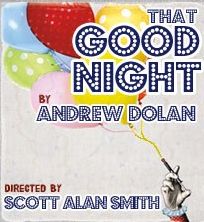THIS ALMOST GREAT NIGHT
Andrew Dolan, a working actor perhaps better known as a writer, had his second completed play produced first, in a Los Angeles world premiere: last season’s knockout EST production of his very smart race-and-academic politics piece, The Many Mistresses of Martin Luther King. That play exemplifies all that is most promising about new American theater – provocative but not petulant, hyper-literate and poignant and demanding much of its audience while avoiding the bookend-crimes of masturbation and pandering … except for the denouement, a scene of gratuitous redundancy. After the breathtaking intelligence and tact of the previous two hours, that last bit was a real surprise and disappointment. One did not expect a writer who encouraged such faith to let down in such a manner, but it was an easily-snipped ten minutes. Now, after The Road Theatre’s world premiere of Dolan’s first full-length play, That Good Night, those final moments of MMMLK seem like a warning shot.
Once again, though, for almost two full acts this playwright seems a godsend: willing to explore unpleasant territory and exploit its emotional and philosophical resources for more than they would seem worth. That Good Night is yet another comic drama of family disunity, that undying American theme of wills and other filial injustices, but so much of it is accurate and funny that it’s easy to ignore the familiar circumstances.
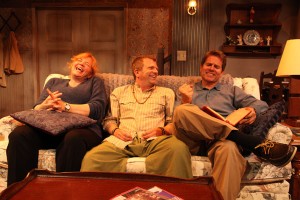 A far-flung brood gathers at uber-Catholic mom’s (Judith Scarpone’s) house to pull the plug on dad’s (Leon Russom’s) life-support. Successful lawyer Chuck (John Cragen) brings along the much-younger Louise (Keelia Flinn), who’s at least tangentially involved in breaking up his marriage; Buddhist Danny (Chet Grissom) and wife Gretchen (Melissa Kite) bring photos of their newly adopted Korean boys (dad’s a Korean war hero, hardy har); advertising copywriter Alice (Elizabeth Sampson) brings a secret, her finally published family-skeletons-spilling short story. Baby of the family and perennial screw-up Sean (Bernie Zilinskas), a 37-year-old party clown still living at home, shoots dope and makes the mordant commentary that serves this play as a lively but ultimately disorienting chorus.
A far-flung brood gathers at uber-Catholic mom’s (Judith Scarpone’s) house to pull the plug on dad’s (Leon Russom’s) life-support. Successful lawyer Chuck (John Cragen) brings along the much-younger Louise (Keelia Flinn), who’s at least tangentially involved in breaking up his marriage; Buddhist Danny (Chet Grissom) and wife Gretchen (Melissa Kite) bring photos of their newly adopted Korean boys (dad’s a Korean war hero, hardy har); advertising copywriter Alice (Elizabeth Sampson) brings a secret, her finally published family-skeletons-spilling short story. Baby of the family and perennial screw-up Sean (Bernie Zilinskas), a 37-year-old party clown still living at home, shoots dope and makes the mordant commentary that serves this play as a lively but ultimately disorienting chorus.
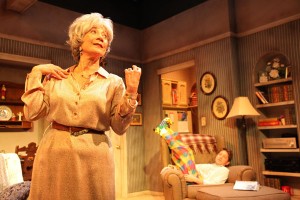 Rivalries and old grudges and reversions to childhood roles bring verisimilitude to this hoary set-up, and some really lovely poetry (especially in the second act) raises the level of the discourse. Yes, there is rather too much in the way of sit-com-ism (mom piping Psalmic platitudes into the middle of high-stakes fraternal screaming matches; hopelessly uncool foreign-name gags) and cheap tricks (Louise presented as comically stupid in the first act but, conveniently, a savant in the second). But the writing mostly uses comedy to reveal character and further story rather than congratulate itself on its wit. These lapses are especially forgivable given that this is a first play, and that so much of it feels so mature.
Rivalries and old grudges and reversions to childhood roles bring verisimilitude to this hoary set-up, and some really lovely poetry (especially in the second act) raises the level of the discourse. Yes, there is rather too much in the way of sit-com-ism (mom piping Psalmic platitudes into the middle of high-stakes fraternal screaming matches; hopelessly uncool foreign-name gags) and cheap tricks (Louise presented as comically stupid in the first act but, conveniently, a savant in the second). But the writing mostly uses comedy to reveal character and further story rather than congratulate itself on its wit. These lapses are especially forgivable given that this is a first play, and that so much of it feels so mature.
The real tragedy of this largely well-balanced drama is that it does not examine the most compelling questions it raises. It need not answer them, but to give a debutante’s introduction to plot points (what’s in Alice’s story?), modes (magical realism), and storylines (a romance; a resurrection), then snub them by inserting a confusing mess of new darlings, even information dressed adorably in carefully arranged foreshadow and allusion, is to fail as a master of ceremonies. Was it all a dream? If it all happened, then where’s the third act to support the new circumstances? Did some of it happen? If so, which of it? If something doesn’t really happen, can it matter dramatically?
The thematic value of any gesture is in direct ratio to its expedience. We know that a device has worked when it satisfies on emotional and intellectual grounds. After all that excellence, this play does an abrupt, sophomoric about-face in its final five minutes, a tonal and logical switcheroo that the playwright apparently considers clever. But when outsmarting your audience, you must not also outsmart yourself. A mindfuck is a terrible thing to waste.
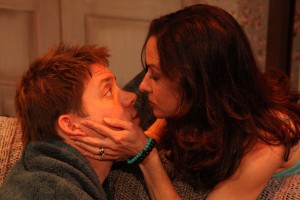 Mr. Dolan has been immaculately fortunate to have had his first two produced plays embarrassingly well cast. The That Good Night ensemble is composed of so many standouts that this review, for purposes of space, will single out only the showstopper Mr. Russom, who by his surpassing competence soups up every vehicle in which he features even slightly. The MMMLK production also had the advantage of Rod Menzies’ careful, analytical direction. That Good Night has Scott Alan Smith, a director very good with actors and pacing but perhaps less suited for the sort of textual investigation necessary to a mess of this magnitude. A method of presentation may exist in which Mr Dolan’s surprise ending would achieve at least fleeting coherence, but this production does not employ it such as to illuminate this audience member.
Mr. Dolan has been immaculately fortunate to have had his first two produced plays embarrassingly well cast. The That Good Night ensemble is composed of so many standouts that this review, for purposes of space, will single out only the showstopper Mr. Russom, who by his surpassing competence soups up every vehicle in which he features even slightly. The MMMLK production also had the advantage of Rod Menzies’ careful, analytical direction. That Good Night has Scott Alan Smith, a director very good with actors and pacing but perhaps less suited for the sort of textual investigation necessary to a mess of this magnitude. A method of presentation may exist in which Mr Dolan’s surprise ending would achieve at least fleeting coherence, but this production does not employ it such as to illuminate this audience member.
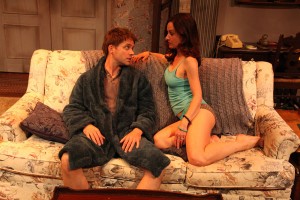 This is the sort of play which at intermission fills the heart with hope and afterward leaves a muscle rather deflated by careless punctures. To recommend that audiences pay for the beauty of That Good Night‘s first two hours and then rise en masse at the penultimate lights-out, fumbling for the exit so as to retain the promise of beauty – to make such a recommendation would be the act of a desperate romantic. Do it. To miss Leon Russom’s dreamily present monologues, and the entire cast’s engagement with all that’s best in an exquisitely frustrating script, would be to avoid a circus for fear of the clown.
This is the sort of play which at intermission fills the heart with hope and afterward leaves a muscle rather deflated by careless punctures. To recommend that audiences pay for the beauty of That Good Night‘s first two hours and then rise en masse at the penultimate lights-out, fumbling for the exit so as to retain the promise of beauty – to make such a recommendation would be the act of a desperate romantic. Do it. To miss Leon Russom’s dreamily present monologues, and the entire cast’s engagement with all that’s best in an exquisitely frustrating script, would be to avoid a circus for fear of the clown.
photos by Deverill Weekes
That Good Night
The Road Theatre Company in North Hollywood (Los Angeles Theater)
scheduled to end on July 21, 20012
for tickets, visit http://RoadTheatre.org
